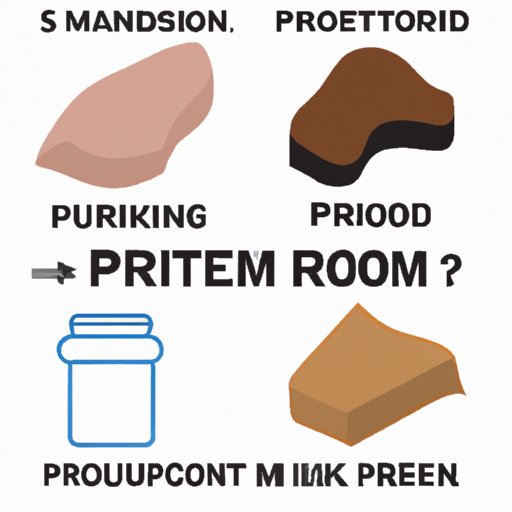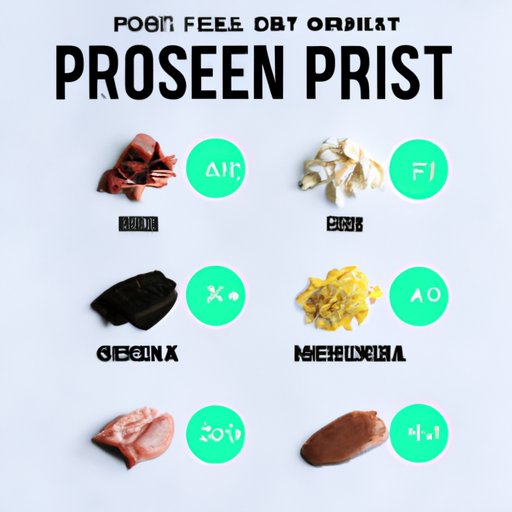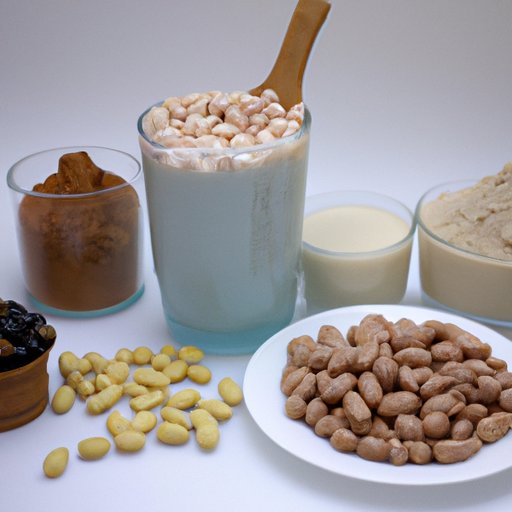Introduction
Protein is an essential nutrient that plays an important role in building and maintaining healthy muscles, bones, skin, hair, and other tissues. It also helps the body produce hormones, enzymes, and antibodies. With so many different types of protein available, it’s important to choose the right one for your diet. In this article, we’ll explore the different types of protein, the pros and cons of each, and how to choose the best protein for your diet.
Comparing Different Types of Protein: What is the Best Protein to Eat?
There are three main categories of protein: animal-based proteins, plant-based proteins, and dairy-based proteins. Let’s take a closer look at each type.
Animal-Based Proteins
Animal-based proteins include meat, poultry, fish, eggs, and dairy products. These foods are often high in saturated fat and cholesterol, so they should be eaten in moderation. They are also usually high in vitamins and minerals such as iron, zinc, and B vitamins.
Plant-Based Proteins
Plant-based proteins include beans, nuts, seeds, grains, and soy products. These foods are typically low in saturated fat and cholesterol, and they offer a variety of vitamins and minerals, including fiber, vitamin C, and magnesium. They are also typically lower in calories than animal-based proteins.
Dairy-Based Proteins
Dairy-based proteins include milk, yogurt, cheese, and whey protein powder. Dairy is a great source of calcium, phosphorus, and vitamin D. It is also a good source of high-quality protein, making it an excellent choice for those looking to build muscle or lose weight.
The Pros and Cons of Eating Different Types of Protein
Animal-Based Proteins
Pros: Animal-based proteins are generally high in vitamins and minerals, especially B vitamins, iron, and zinc. They are also usually high in protein and can help increase muscle mass.
Cons: Animal-based proteins tend to be higher in saturated fat and cholesterol, which can increase the risk of heart disease. They can also be more expensive than other sources of protein.
Plant-Based Proteins
Pros: Plant-based proteins are usually lower in saturated fat and cholesterol, and they offer a variety of vitamins and minerals, including fiber, vitamin C, and magnesium. They are also typically lower in calories than animal-based proteins.
Cons: Plant-based proteins may not provide enough essential amino acids to meet your daily needs, so you may need to supplement with other sources of protein. They can also be difficult to digest for some people.
Dairy-Based Proteins
Pros: Dairy-based proteins are a great source of calcium, phosphorus, and vitamin D. They are also a good source of high-quality protein, which can help you build muscle or lose weight.
Cons: Dairy-based proteins can be high in saturated fat and cholesterol, so they should be eaten in moderation. They can also cause digestive issues for some people.

Exploring the Nutritional Benefits of Eating Different Types of Protein
Animal-Based Proteins
Animal-based proteins are generally high in vitamins and minerals, especially B vitamins, iron, and zinc. They are also usually high in protein and can help increase muscle mass. Eating lean cuts of meat can help reduce the amount of saturated fat and cholesterol in your diet.
Plant-Based Proteins
Plant-based proteins offer a variety of vitamins and minerals, including fiber, vitamin C, and magnesium. They are also typically lower in calories than animal-based proteins. Additionally, they are usually free from saturated fat and cholesterol, making them a healthier option.
Dairy-Based Proteins
Dairy-based proteins are a great source of calcium, phosphorus, and vitamin D. They are also a good source of high-quality protein, which can help you build muscle or lose weight. However, dairy-based proteins can be high in saturated fat and cholesterol, so they should be eaten in moderation.
Plant-Based vs Animal-Based Proteins: Which is the Best Option?
Both plant-based and animal-based proteins have their advantages and disadvantages. Here’s a quick overview of the pros and cons of each type:
Advantages of Plant-Based Proteins
- Low in saturated fat and cholesterol
- High in fiber, vitamins, and minerals
- Lower in calories
- Usually free from hormones and antibiotics
Advantages of Animal-Based Proteins
- High in protein
- Rich in vitamins and minerals
- Easier to digest
- High in bioavailable nutrients
Disadvantages of Plant-Based Proteins
- May not provide enough essential amino acids
- Can be difficult to digest for some people
- Can be more expensive than animal-based proteins
Disadvantages of Animal-Based Proteins
- High in saturated fat and cholesterol
- Can contain hormones and antibiotics
- Can be more expensive than plant-based proteins
When deciding between plant-based and animal-based proteins, it’s important to consider your health goals, dietary preferences, budget, and lifestyle. Eating a variety of protein sources can help ensure you get all the essential nutrients you need.

A Guide to Choosing the Best Protein for Your Diet
Choosing the best protein for your diet doesn’t have to be overwhelming. Here are some tips to help you make the right choice:
Consider Your Health Goals
If you’re trying to gain muscle or lose weight, animal-based proteins may be the best choice since they are typically higher in protein and essential amino acids. If you’re trying to reduce your cholesterol levels, plant-based proteins may be the better option since they are usually lower in saturated fat and cholesterol.
Consider Your Dietary Preferences
If you’re vegetarian or vegan, plant-based proteins may be the only option. If you’re lactose intolerant, dairy-based proteins may not be a good choice. Consider what foods you already eat and try to incorporate more of those into your diet.
Consider Your Budget
Animal-based proteins can be more expensive than plant-based and dairy-based proteins. Consider your budget when choosing the best protein for your diet.
Take Advantage of Variety
Eating a variety of protein sources can help ensure you get all the essential nutrients you need. Try to mix up your protein sources, and don’t be afraid to experiment with different types of food.
Conclusion
Choosing the best protein for your diet doesn’t have to be complicated. Animal-based proteins are generally higher in protein and essential amino acids, while plant-based proteins are usually lower in saturated fat and cholesterol. Dairy-based proteins offer a good source of calcium, phosphorus, and vitamin D. Consider your health goals, dietary preferences, budget, and lifestyle when deciding which type of protein is best for you. Eating a variety of protein sources can help ensure you get all the essential nutrients you need.
(Note: Is this article not meeting your expectations? Do you have knowledge or insights to share? Unlock new opportunities and expand your reach by joining our authors team. Click Registration to join us and share your expertise with our readers.)
